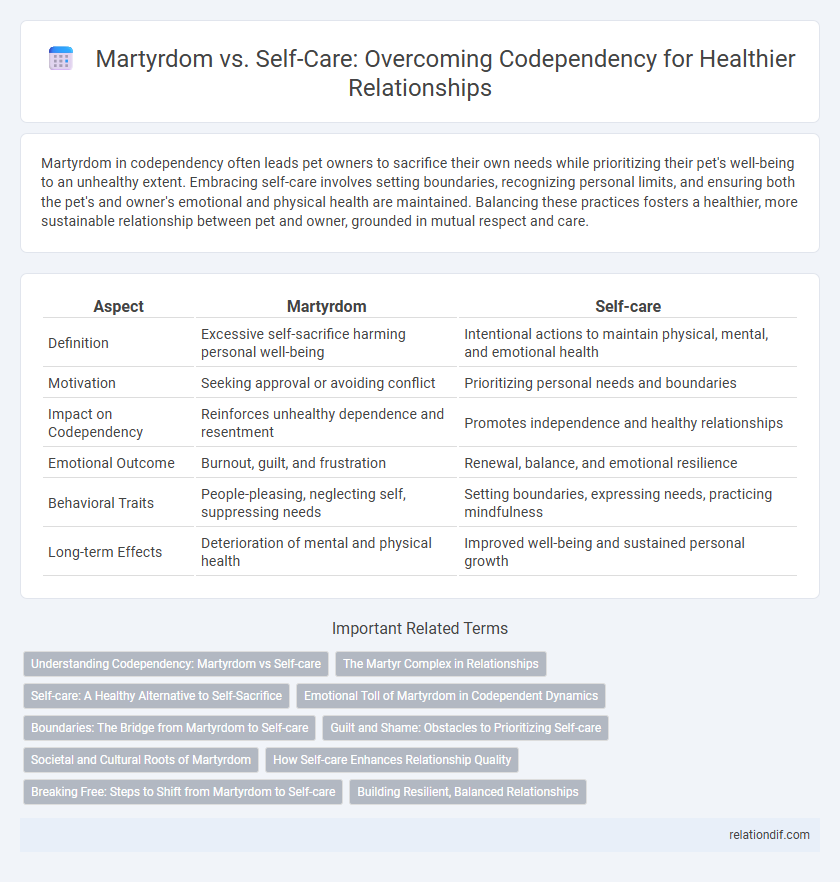Martyrdom in codependency often leads pet owners to sacrifice their own needs while prioritizing their pet's well-being to an unhealthy extent. Embracing self-care involves setting boundaries, recognizing personal limits, and ensuring both the pet's and owner's emotional and physical health are maintained. Balancing these practices fosters a healthier, more sustainable relationship between pet and owner, grounded in mutual respect and care.
Table of Comparison
| Aspect | Martyrdom | Self-care |
|---|---|---|
| Definition | Excessive self-sacrifice harming personal well-being | Intentional actions to maintain physical, mental, and emotional health |
| Motivation | Seeking approval or avoiding conflict | Prioritizing personal needs and boundaries |
| Impact on Codependency | Reinforces unhealthy dependence and resentment | Promotes independence and healthy relationships |
| Emotional Outcome | Burnout, guilt, and frustration | Renewal, balance, and emotional resilience |
| Behavioral Traits | People-pleasing, neglecting self, suppressing needs | Setting boundaries, expressing needs, practicing mindfulness |
| Long-term Effects | Deterioration of mental and physical health | Improved well-being and sustained personal growth |
Understanding Codependency: Martyrdom vs Self-care
Codependency often manifests as martyrdom, where individuals sacrifice their needs excessively to please others, leading to emotional exhaustion and blurred boundaries. Understanding the difference between martyrdom and self-care is critical in recognizing codependent behaviors, as self-care involves setting healthy limits and prioritizing personal well-being without guilt. By embracing self-care, individuals can break free from codependent patterns and foster balanced, nurturing relationships.
The Martyr Complex in Relationships
The Martyr Complex in relationships often manifests as excessive self-sacrifice, where one partner prioritizes the other's needs at the expense of their own well-being, reinforcing unhealthy codependency. This behavior undermines genuine self-care by fostering resentment and emotional exhaustion rather than mutual support and balanced boundaries. Recognizing and addressing martyrdom patterns is essential for cultivating healthier dynamics and promoting emotional autonomy within partnerships.
Self-care: A Healthy Alternative to Self-Sacrifice
Self-care involves setting boundaries, prioritizing personal well-being, and engaging in activities that nurture mental, emotional, and physical health, contrasting sharply with the harmful patterns of martyrdom often seen in codependency. Emphasizing self-care fosters resilience and autonomy, reducing the tendency to derive self-worth solely from sacrificing one's needs for others. Incorporating regular self-care practices enhances overall life satisfaction, improves relationships, and supports long-term emotional stability.
Emotional Toll of Martyrdom in Codependent Dynamics
Martyrdom in codependent dynamics often leads to significant emotional exhaustion, as individuals repeatedly suppress their own needs to prioritize others' well-being. This persistent self-neglect fosters feelings of resentment, low self-worth, and chronic stress, undermining personal mental health. Effective self-care breaks this cycle by encouraging healthy boundaries and emotional resilience, essential for restoring balance in relationships.
Boundaries: The Bridge from Martyrdom to Self-care
Boundaries serve as the essential bridge from martyrdom to self-care by establishing clear limits that protect individual well-being and prevent burnout. Recognizing personal needs and communicating them assertively interrupts the cycle of over-sacrifice often seen in codependency. Effective boundary-setting fosters healthy relationships and nurtures self-respect, promoting emotional resilience and balance.
Guilt and Shame: Obstacles to Prioritizing Self-care
Guilt and shame often cripple individuals caught in codependency, making self-care feel selfish or undeserved. These powerful emotions reinforce martyrdom by promoting sacrifice at the expense of personal well-being. Overcoming these barriers requires recognizing the intrinsic value of self-care as essential for healthy relationships and emotional resilience.
Societal and Cultural Roots of Martyrdom
Martyrdom in codependency often stems from deep-seated societal and cultural expectations that glorify self-sacrifice and prioritize the needs of others above personal well-being. These cultural narratives frequently reinforce the belief that enduring hardship for others is virtuous, which can obscure the importance of healthy self-care boundaries. Understanding these roots reveals how pervasive social norms contribute to the internalization of martyrdom, making self-care a critical act of resistance against ingrained patterns of neglect.
How Self-care Enhances Relationship Quality
Self-care enhances relationship quality by fostering emotional resilience and clear boundaries, reducing the risk of burnout commonly seen in codependent dynamics. Prioritizing personal well-being allows individuals to engage more authentically and empathetically, strengthening trust and mutual respect with partners. Research shows that consistent self-care practices correlate with higher relationship satisfaction and healthier communication patterns.
Breaking Free: Steps to Shift from Martyrdom to Self-care
Breaking free from martyrdom requires recognizing patterns of self-sacrifice that undermine personal well-being and establishing healthy boundaries to protect emotional and mental health. Implementing daily self-care routines, such as mindfulness practices and seeking support from therapy or support groups, strengthens autonomy and nurtures self-worth. Prioritizing personal needs fosters resilience, allowing individuals to transition from codependent dynamics to balanced relationships.
Building Resilient, Balanced Relationships
Martyrdom in codependency often manifests as sacrificing personal needs to please others, which undermines emotional resilience and fosters imbalance in relationships. Embracing self-care reinforces boundaries, promotes mutual respect, and nurtures a healthy interdependence. Building resilient, balanced relationships requires prioritizing self-worth while supporting partners without neglecting one's own well-being.
Martyrdom vs Self-care Infographic

 relationdif.com
relationdif.com